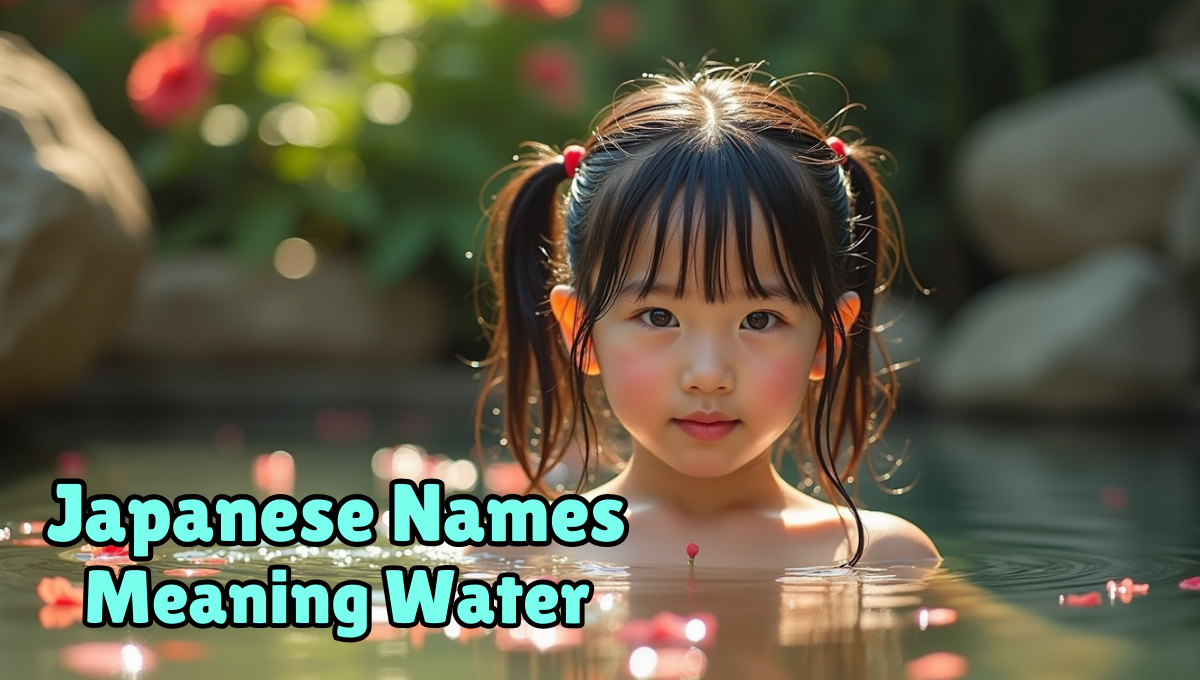“Best Japanese Names Meaning Water” are more than just names—they carry deep cultural meaning. In Japan, water symbolizes purity, peace, and life itself. From gentle rivers to powerful ocean waves, it shapes the world and inspires beautiful names.
Japanese names often reflect the beauty of nature, telling stories through their meanings. Water-related names capture the fluidity, strength, and serenity of this vital element. Whether you’re choosing a name for a baby, a character, or simply enjoy discovering poetic names, this list will spark your imagination. Let’s dive into some of the most enchanting Japanese names inspired by water!
Female Water Meaning Japanese Names

Explore charming Japanese water-themed names for girls, evoking serenity, vitality, and a nature connection, showcasing cultural beauty.
- Kawa – River, representing life’s journey and continuous flow.
- Ryuu – Dragon, often linked with water in Japanese folklore.
- Masumi – True clarity, representing the purity of water.
- Mizuho – Abundant water, signifying prosperity and nourishment.
- Mizuki – Beautiful moon reflecting on water, symbolizing clarity and reflection.
- Kiyomi – Pure beauty, symbolizing the clarity of water.
- Fuyumi – Winter beauty, representing snow and serenity.
- Rika – Jasmine, often associated with water and growth.
- Asahi – Morning sun, reflecting on water’s surface.
- Seina – Star and water, symbolizing guidance and fluidity.
- Harumi – Clear spring, representing fresh beginnings.
- Kona – Water’s edge, symbolizing connection to land and sea.
- Nozomi – Hope, like the gentle flow of a stream.
- Yasuko – Peaceful child, embodying tranquility like still water.
- Ami – Friend, symbolizing the nurturing nature of rivers.
- Kikyou – Bellflower, often found near water, symbolizing beauty.
- Ren – Lotus, which thrives in water, representing purity.
- Hikari – Light, reflecting on water, symbolizing clarity.
- Natsumi – Summer beauty, reminiscent of warm, flowing waters.
- Sayuri – Small lily, symbolizing purity and grace in water.
- Kira – Sparkle, like sunlight dancing on water’s surface.
- Miyu – Beautiful reason, reflecting the wisdom of water.
- Yuriko – Lily child, connecting to water and beauty.
- Atsuko – Kind child, embodying the nurturing aspect of water.
- Satsuki – May, when water and life flourish.
- Rin – Bell, often associated with gentle water sounds.
- Tsubaki – Camellia, a flower often found near water.
- Chiyo – A thousand generations, representing timeless flow.
- Fumiko – Child of abundant beauty, like flowing water.
- Kaori – Fragrance, reminiscent of flowers blooming near water.
- Katsumi – Victorious beauty, symbolizing strength like water.
- Akiko – Autumn child, where leaves fall into still waters.
- Nao – Honest, representing the clarity of flowing streams.
- Shizuka – Quiet, embodying the calmness of still water.
- Eri – Blessed prize, symbolizing the treasure of water.
- Miyuki – Beautiful snow, connecting water in its purest form.
Male Water Meaning Japanese Names

Exploring male Japanese water names reveals deep meanings, cultural significance, and a serene nature connection.
- Minato – Translates to harbor, symbolizing a safe haven and tranquility.
- Suijin – Named after the Shinto god of water, embodying power and fluidity.
- Nagisa – Means beach, evoking calmness and the soothing nature of the sea.
- Ryuunosuke – Dragon with water element, symbolizing strength and adaptability.
- Kawa – River, representing life’s journey and constant flow.
- Ren – Lotus, which thrives in water, symbolizing purity and resilience.
- Sui – Water, representing adaptability and the essence of life.
- Umi – Ocean, embodying vastness and mystery.
- Riku – Land, often associated with the meeting of land and water.
- Kohaku – Amber, reminiscent of sunlight filtering through water.
- Hikaru – Light, representing the shimmering surface of water.
- Tsubasa – Wings, symbolizing freedom as water flows.
- Haruto – Sunlight on water, signifying warmth and clarity.
- Kiyoshi – Pure, reflecting the clarity of clean water.
- Yasuo – Peaceful man, embodying the tranquility of still waters.
- Taki – Waterfall, symbolizing strength and beauty.
- Seiji – Clear, representing the transparency and honesty of water.
- Shou – Victory, symbolizing the unstoppable force of flowing water.
- Tsunami – Harbor wave, evoking the power of the ocean.
- Fuyuki – Winter tree, representing the beauty of frozen water.
- Kentarou – Strong boy, embodying resilience like a river.
- Natsuki – Summer hope, representing the warmth of water.
- Sora – Sky, symbolizing the water cycle and freedom.
- Yuki – Snow, representing tranquility and the beauty of winter.
- Aoi – Blue, reminiscent of clear, deep waters.
- Haruki – Spring child, representing new beginnings and vitality.
- Mizuto – Water person, symbolizing a connection to nature.
- Ryu – Dragon, often associated with water in folklore.
- Kazuki – Harmony and hope, reflecting a peaceful water surface.
- Takumi – Artisan, representing the skill in navigating water.
- Kou – Happiness, symbolizing the joy found in nature.
- Noboru – To rise, like the tide coming in.
- Ichirou – First son, representing a strong foundation like a river.
Famous Water Meaning Japanese Names

Famous Japanese water names highlight serenity, strength, and cultural beauty.
- Suijin – God of water, embodying power and fluidity.
- Nagisa – Beach, evoking calmness and the soothing nature of the sea.
- Ryuunosuke – Dragon with water element, symbolizing strength and adaptability.
- Haru – Spring, a season associated with fresh water and renewal.
- Kawa – River, representing life’s journey and constant flow.
- Ren – Lotus, thriving in water, symbolizing purity and resilience.
- Sui – Water, representing adaptability and the essence of life.
- Umi – Ocean, embodying vastness and mystery.
- Kohaku – Amber, reminiscent of sunlight filtering through water.
- Hikaru – Light, representing the shimmering surface of water.
- Tsubasa – Wings, symbolizing freedom as water flows.
- Haruto – Sunshine on water, signifying warmth and clarity.
- Kiyoshi – Pure, reflecting the clarity of clean water.
- Yasuo – Peaceful man, embodying the tranquility of still waters.
- Taki – Waterfall, symbolizing strength and beauty.
- Seiji – Clear, representing the transparency and honesty of water.
- Shou – Victory, symbolizing the unstoppable force of flowing water.
- Tsunami – Harbor wave, evoking the ocean’s power.
- Fuyuki – Winter tree, representing the beauty of frozen water.
- Kentarou – Strong boy, embodying resilience like a river.
- Natsuki – Summer hope, representing warmth and vitality.
- Yuuto – Gentle person, embodying the softness of flowing water.
- Kiyomizu – Clear water, representing purity and clarity.
- Kaito – Ocean flying, symbolizing adventure and exploration.
- Haruki – Spring child, representing new beginnings and vitality.
- Mizuto – Water person, symbolizing a connection to nature.
- Ryu – Dragon, often associated with water in folklore.
- Kazuki – Harmony and hope, reflecting a peaceful water surface.
- Takumi – Artisan, representing skill in navigating water.
- Kou – Happiness, symbolizing joy found in nature.
- Ichirou – First son, representing a strong foundation like a river.
- Katsumi – Victorious beauty, symbolizing the allure of water.
- Toshiyuki – Year of happiness, reflecting a bountiful river.
- Ryou – Refreshing, embodying the invigorating nature of water.
- Hiroshi – Generous, representing abundance in rivers.
FAQs
Q. What are some popular Japanese names that mean water?
Some popular Japanese names related to water include Mizuki (beautiful moon + water), Kaito (ocean flying), Ren (lotus), Sui (water), and Nami (wave).
Q. Do Japanese water-related names have special meanings?
Yes! Many names symbolize purity, tranquility, strength, and renewal—just like water itself. The meaning often comes from the kanji used in the name.
Q. Are these names suitable for both genders?
Yes! Some names, like Mizuki and Sui, are unisex, while others like Kaito (boy) and Nami (girl) are more commonly used for a specific gender.
Q. Can I use a Japanese water name if I’m not Japanese?
Absolutely! As long as you respect the culture and meaning behind the name, you can choose one that resonates with you.
Q. What kanji are commonly used for water-related names?
Kanji like 水 (mizu, sui – water), 海 (umi – ocean), 波 (nami – wave), and 涼 (ryo – cool, refreshing) are often found in water-related names.
Q. Are water names common in Japan?
Yes, nature-based names, especially those related to water, are quite popular in Japan because they reflect beauty, strength, and harmony with nature.
Q. How do I choose the best Japanese water name?
Consider the meaning, kanji, and sound of the name. Choose one that feels personal and reflects the qualities you admire about water.
Conclusion
Best Japanese Names Meaning Water are more than just words they embody meanings of purity, tranquility, and strength. Whether you’re naming a child, a character, or exploring Japanese culture, these names reflect water’s essence in unique ways. From gentle streams to vast oceans, each name tells a story of nature’s flow and harmony. We hope this list helps you find a name that resonates with you. Let the beauty and serenity of water guide your choice!


